#Jayne Pickering
Explore tagged Tumblr posts
Text
Since I’m in the spirit of the season I thought I’d gift some of my audios from this year feel free to trade and gift as normal
Evita Leicester Curve January 11 2024
Martha Kirby (Eva Peron) Harry Chandler (u/s Che) Gary Milner (Peron) Dan Partridge (Magaldi) Chumisa Dornford-May (Perons Mistress)
Harry’s only performance as Che
Evita Leicester Curve January 13 2024
Martha Kirby (Eva Peron) Tyrone Huntley (Che) Gary Milner (Peron) Dan Partridge (Magaldi) Chumisa Dornford-May (Perons mistress)
A Chorus Line UK tour July 13 2024
Adam Cooper (Zach) Carly Mercedes Dyer (Cassie) Jocasta Almgill (Diana) Lydia Bannister (Bebe) Bradley Delarosbel (Greg) Archie Durant (Mark) Joshua Lay (Al) Katie Lee (Kristine) Mireia Mambo (Richie) Kanako Nakano (Judy) Manuel Pacific (Paul) Ashley Jordan Packer (Paul) Kate Parr (Maggie) Rachel Jayne Picar (Connie) Chloe Saunders ((Val Clarke) Toby Seddon (Bobby) Amy Thornton (Sheila) Louie Wood (Don)
Zach calls on Bobby first instead of Mike leading to the song that I can do being cut
Phantom of the opera West End July 20 2024
Jon Robyns (the Phantom of the opera) Chumisa Dornford-May (alt.Christine daae) Joe Griffiths-Brown (Raoul vicomte de chagny) Kelly Glyptis (Carlotta) Samuel Haughton (u/sAndre) Matt Harrop (Firmin) Simon Whitaker (u/s Piangi) Francesca Ellks(Madame Giry) Maiya Hikasa (Meg Giry)
les Miserables West end August 2 2024
Chris Jacobsen (alt. Jean Valjean) Jordan Simon Pollard (u/s Javert) Katie Hall (Fantine) Amena El-Kindy(Eponine’) Luke Kempner (thernardier) Bonnie Langford (t/r Madame thernardier) Jac Yarrow (t/r Marius) Lulu Mae Pears (Cosette) Djavan Van de Fliert (enjolras)
Les Miserables west end November 2 2024
Ian Mcintosh (Jean Valjean) Stewart Clarke (Javert) Anouk van Laake (Fantine) Amena El Kindy (Eponine) Luke Kempner (thernardier) Clare Machin (Madame thernardier) Jacob Dachtler (Marius) Annabelle Aquino (Cosette) Robson Broad (Enjolras)
Phantom of the opera West End November 2 2024
Dean Chisnall (The Phantom of the opera) Colleen Rose Curran ((u/s Christine Daae) Joe Griffiths-Brown (Raoul Vicomte de Changy) Joanna Ampill (Carlotta) Samuel Haughton (u/s Andre) Martin Ball (Firmin) Hywel Dowsell (u/s Piangi) Helen Hobson (Madame Giry) Millie Lyon (Meg Giry)
My Fair Lady Leicester Curve November 23 2024
Molly Lynch (Eliza Doolittle) David Seddon-Young (Henry Higgins) Minal Patel (Colonel Pickering) Steve Furst (Alfre P. Doolittle) Djavan van de Fliert (Freddy Eynsford-Hill) Cathy Tyson (Mrs Higgins) Sarah Moyle (Mrs Eynsford-Hill Mrs Pearce) Jonathan Dryden-Taylor (Harry) Ying ue Li (Jamie) Damian Buhagiar (Zoltan Kaparthy)
During get me to the church on time cast members run down the front row which is caught on the audio causing some disruption
)
#les miserables#les mis london#phantom of the opera#phantom london#chumisa dornford may#stewart clarke#Evita#A chorus Line#My Fair Lady
16 notes
·
View notes
Text

UK Vogue October 1998 "Long Range" Photographer: Kelly Klein Model: Gisele Bündchen Stylist: Jayne Pickering Hair: Mike Lundgen Makeup: Diane Kendal
13 notes
·
View notes
Text
Birthdays 7.19
Beer Birthdays
Adrian Tierney-Jones
Five Favorite Birthdays
Benedict Cumberbatch; English actor (1976)
Edgar Degas; French artist (1834)
Anthony Edwards; actor (1962)
Max Fleischer; animator (1883)
Brian May; rock guitarist (1947)
Famous Birthdays
Yael Abecassis; Israeli model and actress (1967)
Muhammad al-Bukhari; Persian scholar (810)
Marianna Auenbrugger; Austrian composer (1759)
Paule Baillargeon; Canadian actress and director (1945)
Theo Barker; English historian (1923)
Buster Benton; singer-songwriter and guitarist (1932)
Heinrich Christian Boie; German author and poet (1744)
Lizzie Borden; accused murderer (1860)
Vicki Carr; singer (1941)
Allen Collins; guitarist and songwriter (1952)
Samuel Colt; inventor (1814)
Mark Crispin; computer scientist (1956)
A.J. Cronin; writer (1896)
Friedrich Dessauer; German physicist and philosopher (1881)
Atom Egoyan; Egyptian-Canadian director (1960)
Michael Fekete; Hungarian-Israeli mathematician (1886)
Thomas Gabriel Fischer; Swiss musician (1963)
André Forcier; Canadian director and screenwriter (1947)
Helen Gallagher; actress, singer, and dancer (1926)
Keith Godchaux; rock keyboardist (1948)
Alan Gorrie; Scottish singer-songwriter (1946)
Kevin Haskins; English drummer and songwriter (1960)
Joseph Hansen; author and poet (1923)
Samuel John Hazo; author (1928)
Pat Hingle; actor (1924)
Florence Foster Jenkins; soprano (1868)
Richard Jordan; actor (1938)
Gottfried Keller; Swiss author and poet (1819)
Aleksandr Khinchin; Russian mathematician (1894)
Lisa Lampanelli; comedian (1961)
Bernie Leadon; guitarist and songwriter (1947)
Robert Mann; violinist, composer, and conductor (1920)
John Martin; English artist (1789)
Charles Horace Mayo; surgeon, clinic founder (1865)
George McGovern; politician (1922)
Tim McIntire; actor and singer (1944)
Freddy Moore; singer-songwriter and guitarist (1950)
Ilie Nastase; tennis player (1946)
Alice Dunbar Nelson; African-American poet (1875)
Garth Nix; Australian writer (1963)
Jim Norton; comedian (1968)
Mark O'Donnell; playwright (1954)
Steve O'Donnell; screenwriter and producer (1954)
Jayne Anne Phillips; writer (1952)
Edward Charles Pickering; astronomer and physicist (1846)
Martin Powell; English keyboard player and songwriter (1973)
Arthur Rankin Jr.; animation director, producer (1924)
Tom Raworth; English poet (1938)
Miltos Sachtouris; Greek poet (1919)
Campbell Scott; actor (1961)
Elizabeth Spencer; writer (1921)
Percy Le Baron Spencer; microwave inventor (1894)
Sue Thompson; singer (1925)
Rosalyn Sussman Yalow; physicist (1921)
1 note
·
View note
Text
Review: Everything Everything's "Mountainhead"

Mountainhead is to my knowledge the first Everything Everything album truly sold around its concept. At least two of their previous efforts have had thematic through-lines - 'Get To Heaven' around radicalisation, extremism, and in vocalist Higgs' words 'becoming the Other'; and 'Re-Animator' playing with Julian Jaynes' bicameral mind theory. And of course their immediately previous album 'Raw Data Feel' was partially composed with input from an AI and toys with ideas of technology and the future. However, none have been teased with as strong a concept as 'Mountainhead' - set in a dystopian society where a cult is building a mountain by digging a pit, with the lowest members of society living in the pit and the highest on the peak - an immediately compelling metaphor for the rat race and inequality; and of course the title itself recalls Ayn Rand's 'The Fountainhead' and suggests a critique of that work's strident pro-capitalism message.
In practice I am unsure exactly how well this theme comes together - Higgs admits only about half the tracks on the album contribute directly to the theme, and it certainly doesn't seem to me like as a concept album Mountainhead is trying to be a 'rock opera', in the sense of having a story that develops throughout the album.
'Wild Guess' is the album opener, and it seems to me that it's doing triple duty as a re-introduction to the band ("Do you know where I've been (…) where are we now?"), a societal critique ("Take a wild guess" as to where things are going to go from here given the ominous political and environmental trends), and a scene-setting track for the album's concept. When Higgs sings "This is the most important thing you'll ever buy from us" this may be the cult of the mountain selling themselves to an unfortunate convert, or the band itself describing the album; an unsettling duality that blurs the line between the critical perspective of the band and the protagonist (something Higgs has played with on numerous occasions before). It's unusual for an EE song insofar as it begins with a long instrumental section, showing off the band's chops at, perhaps, the expense of an explosive opener. The use of almost barbershop harmonies is a high point. It's grown on me after a few listens and I now think it's above average for the album, despite a bridge that annoys me due to its mixed metaphors ("Nothing but endless fields of bodies swimming in the pit").
(As a note: I think there's a mistake in mixing in this song. At the end of the song, Higgs sings "Oh take a wild guess" while the backing vocals sing "You don't take it in". I think 'take' is probably intended to line up so it hits with some extra punch but never quite manages it)
'The End of the Contender' is a surprising and perhaps weak choice for second song despite being musically solid on its own. One of the singles released ahead of the album, 'Contender' is based in part on the viral video of Ronnie Pickering, a former British boxer who became involved in a road rage incident, raging "Do you know who I am?" (the cyclist didnt'). As such, other than a fleeting reference to Creddahornis, the snake at the bottom of the pit, there's relatively little sense of the album's concept and it's more of a personal meditation on former 'big men' who feel the world has passed them by.
'Cold Reactor' was the first single to be released from the album and remains probably the strongest song on the LP, as well as serving as the most concise description of the album's concept ("So we built the mountain by digging an almighty hole (…)But now the hole is deeper than anybody ever planned/And we're blocking out the sun"). Looking back after the release of the album, Cold Reactor suffers from its slightly schizophrenic premise; it is at once a description of the cult digging frantically to build the mountain, with the protagonist raging ("If God is the mountain he won't answer me a single question"), but also a description of isolation from the perspective of what seems like a shut-in only communicating with others through chat ("I haven't left the house in nearly thirty thousand days; I sent you/The image of a little yellow face") and perhaps planning an act of violence, a call-back to some of the themes of 'Get To Heaven'. It remains however an extremely catchy track with a devastating chorus ("I'm sorry Satan, but I can't do this evil on my own").
'Buddy Come Over' suffers from a weak, if memorable, chorus ("Empty but for us and the vomit/Elvis sitting dead on the toilet") and appears to be describing an individual familiar to the UK political scene - a "sucker for the law" who thinks "PC (has) gone mad". An excellent bridge with a genuinely menacing melody makes up for the chorus ("It's a golden age/I'm wearing half your face").
It's not clear if 'R U Happy?' is intended to be the concept album cult's pitch to members, a first stirring of dissatisfaction by the protagonist in their life ("The mountain is a lie") or a more general statement by the band. While some reviewers enjoyed the themes I felt it was a bit meandering.
'The Mad Stone' was the second of the three singles released ahead of the album launch and seems to be from the perspective of a real estate agent selling homes on the mountain and in the pit. It's a little unclear what part of the narrative voice should be understood to be from an actual cult member - is "I'm a Mountainhead too! What is that, a religion?" a telling aside from the same character who seeks belonging but doesn't seem to know what they're getting into, or two characters in a back and forth? The very rapid falsetto delivery of the chorus may not be everyone's cup of tea.
'TV Dog' should ring bells for listeners of previous albums, where 'dog' is used to mean someone falling prey to propaganda or easily led; who is learning to hear the dog whistles (e.g. 'Lord of the Trapdoor': "This is a whistle for only the dog. Can you believe you were nearly a dog?"). The song opens strongly with a harpsichord leitmotif that recalls 'Two for Nero' and the lyrics "Why is it always/Liars and ballgames/When I turn on the television?"). Sadly, as the song goes on, it seems to lose track of of the metaphor ("If it's not free will/Is it a treadmill?") and is rather short.
(UPDATE: This may be because the line in question was actually taken from another unused song which would have revolved around a shooting at a gym. EE have done this before when they fused 'Only The Dogs' and 'Come Alive Diana' to create the final version of 'Come Alive Diana', with the intriguing line "First I lost an author, then I lost a daughter's awe" sadly not pertaining to anything in the themes of the latter, having been lifted directly from the former.)
'Canary' returns to the themes of the album, while also perhaps developing the themes of the radicalised character from the previous song, with the 'canary under the ground' who gives into the "drumming of the hellkite priest". It suffers from a somewhat repetitious chorus and outro and, in contrast to TV Dog, feels like it drags on somewhat, despite a stronger through-line.
'Don't Ask Me To Beg' is one of the weaker songs on the album from my perspective; it seems to be broadly a breakup song, and despite some memorable lines ("If I'm gonna be tomorrow's bacon/You deserve a Michelin star") the second half lumbers along with the same issues as 'Canary'.
'Enter the Mirror' is clearly being positioned as one of the big tracks of the album, though to my mind it's probably the weakest. Its new-love theme sits uncomfortably coming immediately after 'Don't Ask Me To Beg' and the leitmotif of the chorus "Two! Men! Enter! The! Mirror!" feels worryingly familiar. It's not quite Michael Jackson's "The Man In The Mirror" but isn't far off, which gives it a presumably unintentionally comedic effect.
'Your Money, My Summer' clearly nods back to the band's early single 'MY KZ, UR BF', a track specifically about being confronted by an angry man after cheating with his significant other. Here the message is somewhat vaguer; does the money-splashing protagonist have the 'Babylon witch's' credit card after the breakup in 'Don't Ask Me To Beg'? Confusing matters is the line 'All summer my powers did fade', which seems like it recalls 'Lost Powers', a song about Alex Jones and the Sand Hook shootings.
(UPDATE: The meaning may be given away by the cryptic reference to Robin Hood's Bay, which seems to be referencing Bram Stoker's Dracula, who reaches shore in nearby Whitby after a shipwreck in the form of a dog. 'The dog's in the dinghy sun-tanned' thus seems to identify the parasitic protagonist as a figurative (?) vampire, whose fading powers of seduction may nod back to similar tracks such as 'Warm Healer')
'Dagger's Edge' wasn't a favorite of mine as it felt quite derivative and something I've heard before, both musically and thematically, though it's a lot stronger than the preceding three tracks and I can see why some have labelled it a high point. It connects, oddly, to 'Don't Ask Me To Beg' ("We've all become tomorrow's bacon/The customer is always right") as well as to the 'rancid hellkite' cult.
'City Song' was a standout for me with some evocative synths, and what seems like a nod to the structure of 'No Reptiles' ("They didn't know my name/I didn't know my name"). City Song has been excoriated by some for what is probably the weakest couplet on the album ("You are a woman, and I am a man/We live in the city, and we do what we can"). For my part I assumed this was deliberately trite and not a genuine attempt at a romantic line. It also has for me the best outro on the album.
'The Witness' makes for a strange closer to the album, with its 16-bit MIDI melody and vocals that seem to sit awkwardly on top. For me this (deliberate?) incongruity detracts from what are actually quite powerful lyrics - albeit feeling very cryptic and almost painfully personal: "And the way you wanted it never comes true/And the bird in the shed, it was looking at you/But you blew off its head because that's what we do/And I'll always believe in you". Should we understand the "blinding light" and "water falling" to mean the collapse of the pit and the mountain; the system ending and the light rushing into the darkness? The line "If you stood up in school and just burst into flame" suggests to me this is all still Higgs playing with ideas of martyrdom and terrorism left over from 'Get To Heaven', when the final two tracks on what is billed as a concept album haven't really engaged with the concept, dancing away to a city filled with light or a cryptic scene in a shed where the protagonist kills an avian 'witness'?
Overall ranking each song out of five I ended up with an overall average rating for 'Mountainhead' of 2.78, which is better than Arc and Re-Animator and comparable to 'Raw Data Feel'. However, it's quite front-loaded, with 'The End Of The Contender', 'Cold Reactor', 'Buddy Come Over' and 'Mad Stone' all in the first half. I feel the album progressively loses track of its conceit after 'Canary' and the second half is significantly weaker.
In terms of the overall narrative, you might construct something as follows:
The scene is set ('Wild Guess') with an ominous premonition of the end (the bodies floating in the pit), also serving as a re-introduction to the band itself and its new direction ("Where are we now? - Take a wild guess")
'The End Of The Contender' describes someone who might fall prey to the cult, who feels like yesterday's man and seeks purpose
'Cold Reactor' overtly spells out the setting and how it relates to alienation (the pit = depression and disconnection)
'Buddy Come Over' might (?) suggest attempts to find connection with other people in the pit
'R U Happy?' suggests the protagonist remains dissatisfied with their life
'Mad Stone' introduces a new character, the estate agent who by the end of the song has seemingly joined the cult)
'TV Dog' relates the cult to real-world media on TV radicalising people
'Canary' develops how the protagonists are manipulated and encouraged to sacrifice themselves for the good of the cult
'Don't Ask Me To Beg' suggests some kind of breakup or disagreement with the cult
'Enter The Mirror' sees the protagonist climb the mountain and reach the mirror, reaching some kind of revelation and embarking on a campaign of destruction and arson against the cult
'Your Money. My Summer' might or might not see the protagonist stealing money from the cult (it might also be from the perspective of the cult's leadership, enjoying the unearned fruits of their followers' labours)
'Dagger's Edge' relates the cult situation to the increasingly perilous real-world political landscape
'City Song' sees the protagonist attempting to rediscover themselves in the city after leaving the cult but still feeling unsatisfied
Finally 'The Witness' sees them return and dynamite the mountain, flooding the pit and killing the cult; their last victim is the canary, who saw them commit the crime.
Update: The 'bird in the shed' is a real bird who Higgs shot with an air rifle as a child, with the rest of the song being about "some fucked up stuff that happened to me in the pandemic"; my sense then that this was a painfully personal song seems to have been bourne out. While the lyrics are evocative, the almost chiptune melody and lack of connection to the album make it to my mind a poor closer.
1 note
·
View note
Photo

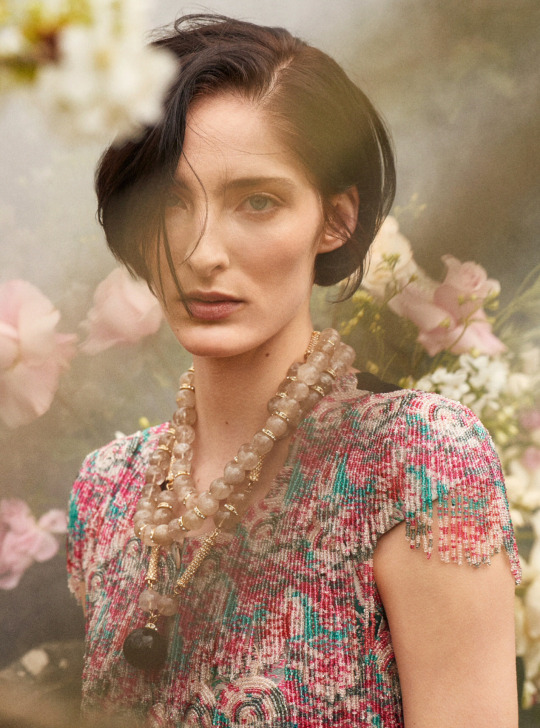



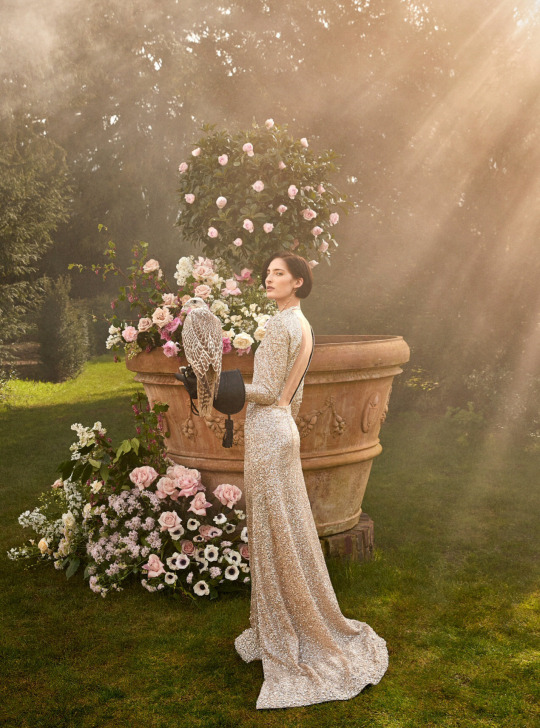
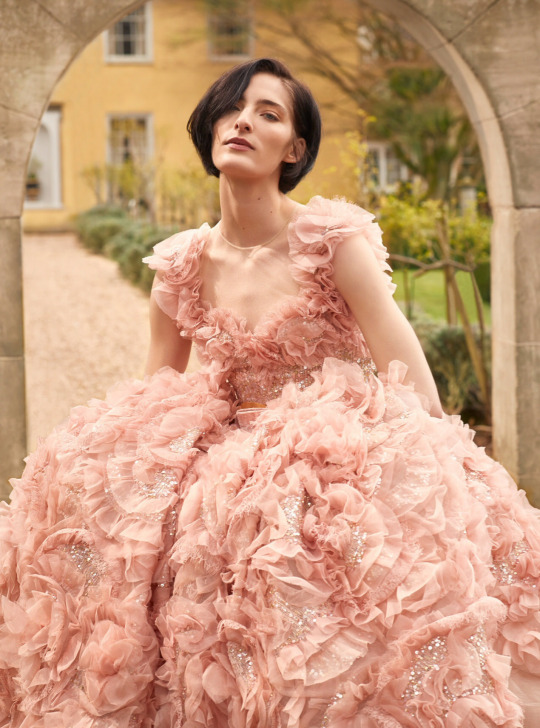
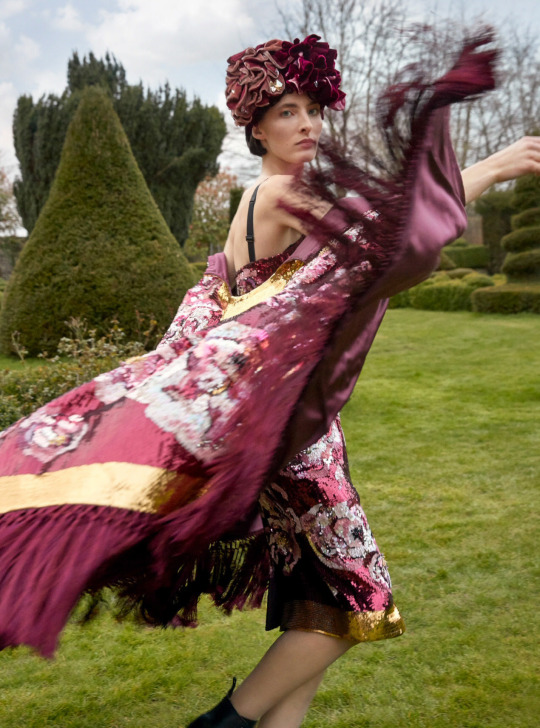
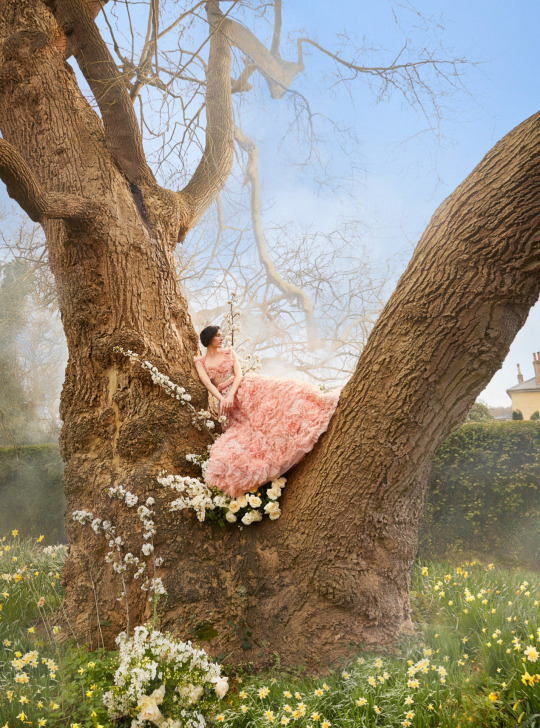
Annie Tice in "A Midsummer Dream", photographed by Richard Phibbs and styled by Jayne Pickering for Town & Country UK Summer 2020
#Annie Tice#Richard Phibbs#Jayne Pickering#fashion#fashion shoot#editorial#Town & Country#Town & Country UK#model#style#glamour#dream#fashion photography
297 notes
·
View notes
Photo

Elizabeth Olsen for Marie Claire UK June 2014
Wearing: Miu Miu dress, tights, and shoes with a Solange Azagury-Partridge ring
Photography: David Roemer Styling: Jayne Pickering Hair: Christoph Hasenbein Makeup: Mary Greenwell
#fashion#elizabeth olsen#marie claire uk#david roemer#jayne pickering#miu miu#fashion editorial#marie claire uk june 2014#black and white photography
61 notes
·
View notes
Photo

Tyg Davison by Camilla Armbrust for Marie Claire UK April 2018
#fashion editorial#fashion photography#marie claire#camilla armbrust#tyg davison#jayne pickering#ramsell martinez#homa safar
27 notes
·
View notes
Photo
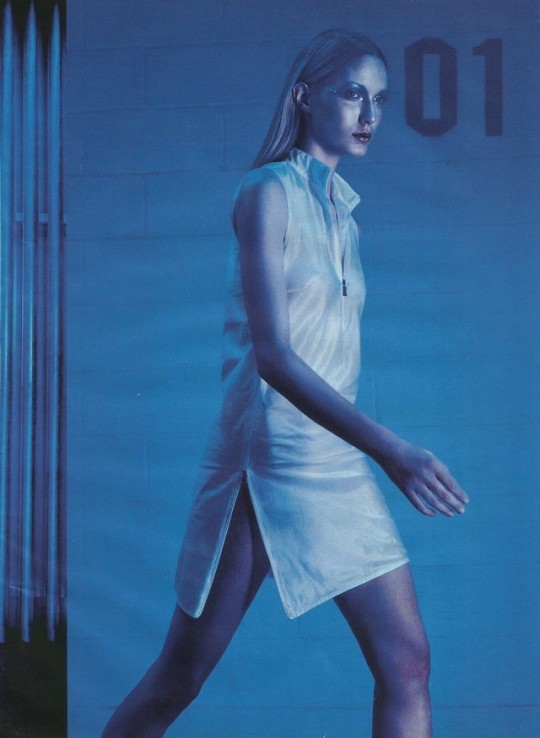
Vogue Russia March 1999 Courtney Herron photographed by Wayne Maser Styling by Jayne Pickering
61 notes
·
View notes
Photo

Marie Claire UK February 2018 Karo Laczkowska by David Roemer.
Photography: David Roemer at Atelier Management. Styled by: Jayne Pickering. Hair: Olivier Lebrun at See Management. Makeup: Clare Read. Manicurist: Robbie Tomkins. Model: Karo Laczkowska.
#marie claire#karo laczkowska#david roemer#jayne pickering#olivier lebrun#clare read#robbie tomkins#prada
2 notes
·
View notes
Photo

4 notes
·
View notes
Photo

Valery Kaufman for the Marie Claire UK March 2017 issue, photographed by David Roemer and styled by Jayne Pickering
71 notes
·
View notes
Photo

Marie Claire UK photographer Jesse Laitinen stylist Jayne Pickering model Karo Laczkowska
17 notes
·
View notes
Text
Birthdays 7.19
Beer Birthdays
Adrian Tierney-Jones
Five Favorite Birthdays
Benedict Cumberbatch; English actor (1976)
Edgar Degas; French artist (1834)
Anthony Edwards; actor (1962)
Max Fleischer; animator (1883)
Brian May; rock guitarist (1947)
Famous Birthdays
Yael Abecassis; Israeli model and actress (1967)
Muhammad al-Bukhari; Persian scholar (810)
Marianna Auenbrugger; Austrian composer (1759)
Paule Baillargeon; Canadian actress and director (1945)
Theo Barker; English historian (1923)
Buster Benton; singer-songwriter and guitarist (1932)
Heinrich Christian Boie; German author and poet (1744)
Lizzie Borden; accused murderer (1860)
Vicki Carr; singer (1941)
Allen Collins; guitarist and songwriter (1952)
Samuel Colt; inventor (1814)
Mark Crispin; computer scientist (1956)
A.J. Cronin; writer (1896)
Friedrich Dessauer; German physicist and philosopher (1881)
Atom Egoyan; Egyptian-Canadian director (1960)
Michael Fekete; Hungarian-Israeli mathematician (1886)
Thomas Gabriel Fischer; Swiss musician (1963)
André Forcier; Canadian director and screenwriter (1947)
Helen Gallagher; actress, singer, and dancer (1926)
Keith Godchaux; rock keyboardist (1948)
Alan Gorrie; Scottish singer-songwriter (1946)
Kevin Haskins; English drummer and songwriter (1960)
Joseph Hansen; author and poet (1923)
Samuel John Hazo; author (1928)
Pat Hingle; actor (1924)
Florence Foster Jenkins; soprano (1868)
Richard Jordan; actor (1938)
Gottfried Keller; Swiss author and poet (1819)
Aleksandr Khinchin; Russian mathematician (1894)
Lisa Lampanelli; comedian (1961)
Bernie Leadon; guitarist and songwriter (1947)
Robert Mann; violinist, composer, and conductor (1920)
John Martin; English artist (1789)
Charles Horace Mayo; surgeon, clinic founder (1865)
George McGovern; politician (1922)
Tim McIntire; actor and singer (1944)
Freddy Moore; singer-songwriter and guitarist (1950)
Ilie Nastase; tennis player (1946)
Alice Dunbar Nelson; African-American poet (1875)
Garth Nix; Australian writer (1963)
Jim Norton; comedian (1968)
Mark O'Donnell; playwright (1954)
Steve O'Donnell; screenwriter and producer (1954)
Jayne Anne Phillips; writer (1952)
Edward Charles Pickering; astronomer and physicist (1846)
Martin Powell; English keyboard player and songwriter (1973)
Arthur Rankin Jr.; animation director, producer (1924)
Tom Raworth; English poet (1938)
Miltos Sachtouris; Greek poet (1919)
Campbell Scott; actor (1961)
Elizabeth Spencer; writer (1921)
Percy Le Baron Spencer; microwave inventor (1894)
Sue Thompson; singer (1925)
Rosalyn Sussman Yalow; physicist (1921)
1 note
·
View note
Photo

Emilie Evander in Marie Claire UK January 2017
Ph: David Roemer Style: Jayne Pickering Hair: Keith Carpenter MUA: Christine Cherbonnier Manicure: Jini Kim
#David Roemer#Jayne Pickering#Keith Carpenter#Christine Cherbonnier#Jini Kim#Emilie Evander#Marie Claire#UK#January#fashion#fashion photography#Fashion Model#fashion magazine#Model#photo#photography#photographer#best fashion photography#fashion photographer#fashion photo
56 notes
·
View notes
Photo

Marie Claire UK September 2010, Editorial "Garden Party". Total look Christian Dior by John Galliano, Ready-to-wear Fall 2010 collection.
Photographer Patric Shaw, Model Fanny Francois, styled by Jayne Pickering
#Dior#Christian Dior#Christian Dior by John Galliano#John Galliano#Galliano#Patric Shaw#Fanny Francois#Jayne Pickering#fashion#fashion shoot#editorial#Marie Claire#Marie Claire UK#aw10#style#model#fashion photography
16 notes
·
View notes
Photo

Jennae Quisenberry by David Roemer for Desert Storm Marie Claire UK March 2018
#fashion editorial#fashion photography#jennae quisenberry#david roemer#marie claire magazine#jayne pickering#nicholas james#clare read
51 notes
·
View notes